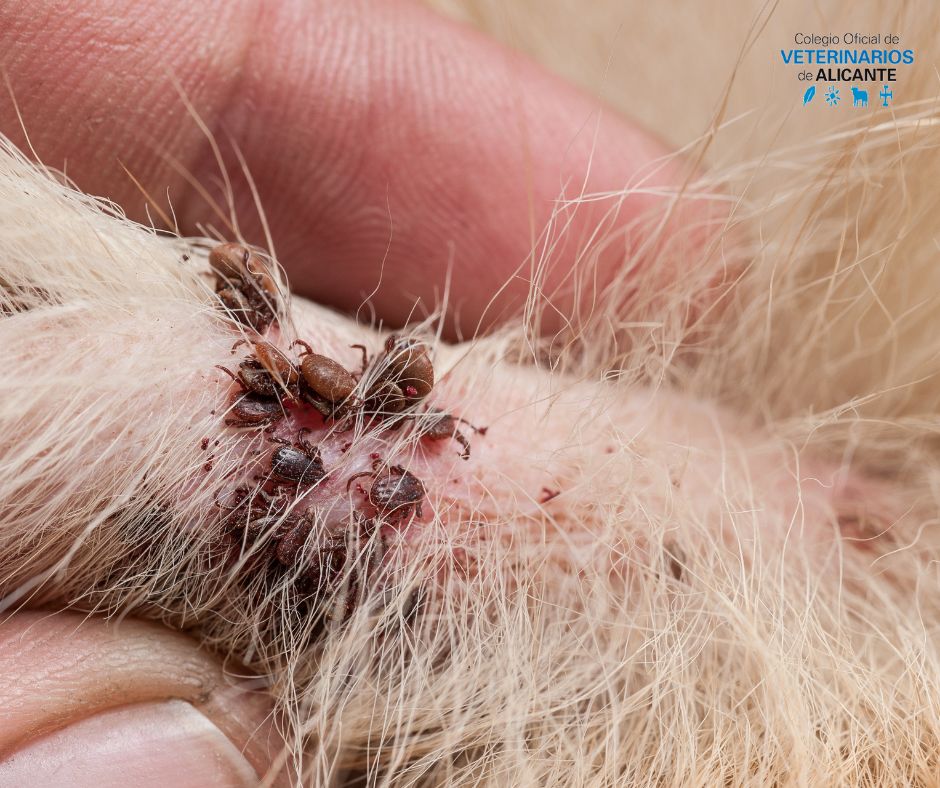

Puede dirigir sus consultas al Colegio de Veterinarios de Alicante enviando un mensaje a la siguiente dirección: secretaria@icoval.org

Ehrlichiosis is an infectious disease caused by bacteria of the genus Ehrlichia. These bacteria are intracellular, which means that they infect and replicate inside the host cells, specifically inside the white blood cells (leukocytes).
Ehrlichiosis is transmitted primarily through the bite of ticks of the genera Amblyomma and Ixodes, which are infected with Ehrlichia spp. Dogs are a common reservoir for this bacterium, and can also transmit it to other animals and humans.
Symptoms usually appear 1 to 2 weeks after the tick bite and include:
In severe cases, it can lead to complications such as respiratory failure, bleeding and multi-organ failure.
Diagnosis is based on clinical symptoms, history of tick exposure and laboratory tests, such as PCR to detect bacterial DNA. Treatment includes antibiotics such as doxycycline, which is effective when given early in the course of the disease.
Babesiosis is a parasitic disease caused by protozoa of the genus Babesia, which infect and destroy red blood cells. It is similar to malaria in its mechanism of infection.
Babesiosis is transmitted mainly through the bite of ticks of the genus Ixodes, the same ticks that transmit Lyme disease. It can also be transmitted through contaminated blood transfusions or from mother to child during childbirth.
Symptoms usually appear 1 to 4 weeks after infection and include:
Diagnosis is made by identification of Babesia in blood smears or by PCR testing. Treatment usually involves a combination of antibiotics and antiparasitics, such as atovaquone and azithromycin, or clindamycin and quinine in severe cases.
Rickettsiosis is a group of diseases caused by bacteria of the genus Rickettsia, which are obligate intracellular and tend to infect the vascular endothelium (the cells that line blood vessels).
Rickettsiosis is mainly transmitted through the bite of infected ticks, but can also be transmitted by fleas and lice, depending on the Rickettsia species. The best known rickettsial disease is Rocky Mountain spotted fever, caused by Rickettsia rickettsii.
Symptoms usually appear 2 to 14 days after the bite and may include:
Diagnosis is based on clinical assessment, vector exposure and serological or PCR testing. The treatment of choice is doxycycline, and is most effective if started early in the course of illness.
Prevention of these diseases focuses on avoiding tick bites:
Ehrlichiosis, babesiosis and rickettsiosis are tick-borne diseases that can be serious if not properly diagnosed and treated. With increased outdoor activity and climate change favouring the spread of ticks, awareness and prevention are critical to protect against these infections.
In short, these diseases share common vectors and require prompt medical attention to prevent serious complications. Prevention, with a focus on avoiding tick bites, is key to reducing the risk of infection.

Puede dirigir sus consultas al Colegio de Veterinarios de Alicante enviando un mensaje a la siguiente dirección: secretaria@icoval.org